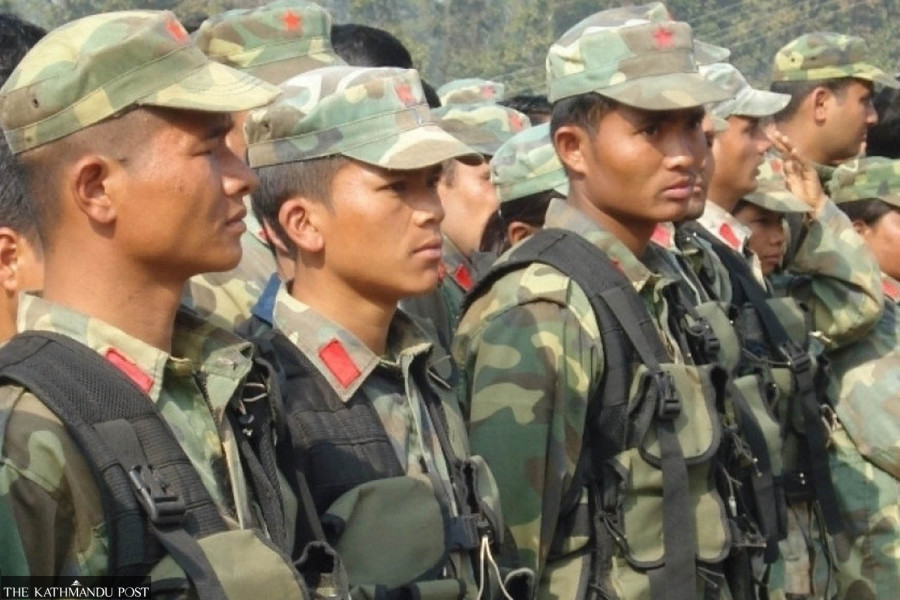
The government’s plan to distribute cash relief to disqualified former Maoist combatants has entered Parliament, but no ruling party appears ready to take ownership of the plan.
Discussing the matter in the House, several parliamentarians have asked the government to halt the cash relief to disqualified former Maoist combatants who are set to receive Rs200,000 per head.
Interestingly, ruling Nepali Congress lawmakers have joined the main opposition CPN-UML and other parties in demanding that the government shelve the cash distribution plan. But some CPN (Maoist Centre) lawmakers argued that the plan was in line with the provision mentioned in the annual budget presented by finance minister Bishnu Poudel in May, 2016.
Also, Finance Minister Prakash Sharan Mahat, who represents the Nepali Congress, on Friday said he was not aware of the cash relief plan.
No such decision has been taken by the Cabinet or the Ministry of Finance, Mahat said while receiving a memorandum against the cash relief plan from a group of youths from a UML-affiliated organisation on Friday.
“But there was such a proposal in previous budgets and it has also been incorporated in the budget for the current fiscal year. But I am not involved in all this. The finance ministry has not made any decision [to provide cash relief to disqualified combatants] and no such proposal has landed in the Cabinet.”
According to the preamble of the working procedure seen by the Post, the Finance Ministry had given a go-ahead to the Home Ministry to prepare the working procedure on March 16 when Prime Minister Dahal was also assuming the finance portfolio. As per the preamble of the working procedure, Rs1.4 billion has been allocated in this year’s budget for concluding the remaining tasks of the peace process and the finance ministry has agreed to release a tranche to pay the disqualified ex-combatants.
“This issue was discussed earlier too. Since I joined the finance ministry, the ministry and myself are not involved in this issue. The working procedure [on the cash relief] was prepared by the home ministry. I have no idea whether the working procedure has been approved by the Cabinet,” said Mahat, while claiming that the government will not release any money to pay the disqualified former Maoist combatants.
As per the provision in the budget, the home ministry can forward the working procedure to the Cabinet, Mahat said.
Mahat was appointed as finance minister on March 31. But the decision to distribute cash to the disqualified Maoist ex-combatants was taken by Prime Minister Pushpa Kamal Dahal who held the finance portfolio following the CPN-UML exit from the government.
According to government sources, as per the Cabinet’s instruction, the home ministry has readied a working procedure to release the cash to the ex-Maoists.
Home Secretary Binod Singh confirmed to the Post on Friday that the ministry has already prepared a working procedure as instructed by the Cabinet to distribute the cash to the Maoist combatants, but the document has not been sent to the Cabinet for approval.
Earlier, on April 13, Home Secretary Singh had told the Post that the ministry had prepared the working procedure. According to it, each district will have a committee, which will verify the names of disqualified Maoist combatants and forward a name list to the home ministry for approval. Cash distribution would begin after the list was approved by the ministry. It was on March 20 that a Cabinet meeting had decided to provide the cash relief.
But the decision drew condemnation from various quarters including some of the ruling parties, Prime Minister Dahal had denied having made such a decision.
Officials say it will cost around Rs800 million to pay the ex-Maoists.
“We are expecting around 2,000 applications from various districts,” said the home secretary. “The number could go up to 4,000.”
The 77 district administration offices will determine whether the disqualified Maoist combatants are out of the country, somewhere in the district, or elsewhere in the country.
But some government sources said the government is unlikely to release cash for the Maoist combatants since the country is reeling under a serious financial crisis.
CPN-UML Chief Whip Padam Giri demanded that the government scrap the working procedure and the cash relief plan immediately.
He said the plan if implemented will burden the already weak economy with an additional Rs1 billion.
“Since the government is struggling to pay for already completed public works, has stalled pension payments to teachers and civil servants, deprived many of social security allowances, and having problems with loan servicing, it should avoid spending haphazardly,” said Giri.
According to the Home Ministry, among the 4,008 combatants rejected for integration, 2,973 were minors, while 1,035 were recruited after the first ceasefire of May 26, 2006—six months before the peace deal was signed.
Of the around 19,000 Maoist fighters who qualified for integration, only around 1,400 chose to join the Nepal Army and the rest preferred voluntary retirement. The government provided between Rs500,000 and Rs800,000 each to those choosing voluntary retirement.
Maoist lawmaker Madhav Sapkota told the House on Friday that the decision to release Rs200,000 each to the disqualified fighters was being hyped unnecessarily. He also claimed that the decision to give Rs200,000 to each of the disqualified fighters was not new.
Sapkota said that such arrangements were also made in 2016 by then finance minister Poudel. He urged the parliamentarians to honour the role played by the Maoist combatants to overthrow the monarchy.












